

QuickWire: Harvard U. Students Are Silenced During MOOC Filming – Wired Campus - Blogs. An English professor at Harvard University turned heads last month when she instructed students in her poetry class to refrain from asking questions during lectures so as not to disrupt recordings being made for the MOOC version of the course.
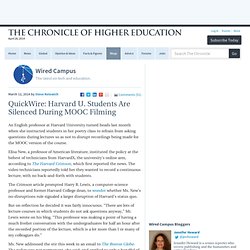
Elisa New, a professor of American literature, instituted the policy at the behest of technicians from HarvardX, the university’s online arm, according to The Harvard Crimson, which first reported the news. The video technicians reportedly told her they wanted to record a continuous lecture, with no back-and-forth with students. The Crimson article prompted Harry R. Lewis, a computer-science professor and former Harvard College dean, to wonder whether Ms. Udacity's Sebastian Thrun, Godfather Of Free Online Education, Changes Course.
There's a story going around college campuses—whispered about over coffee in faculty lounges, held up with great fanfare in business-school sections, and debated nervously by chain-smoking teaching assistants.
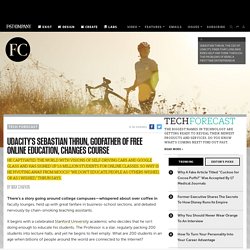
It begins with a celebrated Stanford University academic who decides that he isn't doing enough to educate his students. The Professor is a star, regularly packing 200 students into lecture halls, and yet he begins to feel empty. Does Comparing MOOCs to College Blind Us to Their Real Value? Grand Grocery Co., Lincoln, Neb., Library of Congress When people are comparing MOOCs to the college experience, it’s often to articulate resistance to the MOOC hype by ticking off all the qualities of traditional colleges that are impossible to reproduce and that are precious.
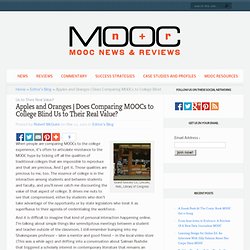
And I get it. From Hype to Nuanced Promise: American Higher Education and the MOOC 3.0 Era. By Cathy Sandeen, Huffington Post That Inside Higher Ed story referred to a theory that I have for some time thought was an appropriate way of thinking about the MOOC evolution: the Gartner technology “hype cycle.”
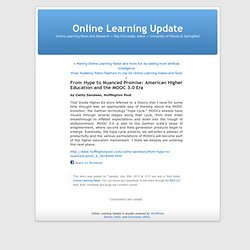
MOOCs already have moved through several stages along that cycle, from their initial breakthrough to inflated expectations and down into the trough of disillusionment. MOOC 3.0 is akin to the Gartner scale’s slope of enlightenment, where second and third generation products begin to emerge. Eventually, the hype cycle predicts, we will enter a plateau of productivity and the various permutations of MOOCs will become part of the higher education mainstream. Business training the next frontier for digital disruption. FutureLearn’s Simon Nelson says executive and personal development is ripe for transition to an online environment.

Photo: Nic Walker Tim Dodd The head of the new UK-based massive open online course (MOOC) provider FutureLearn believes the digital disruption in education will broaden and enter the field of corporate training. Speaking in Australia last week, FutureLearn CEO Simon Nelson said that his company’s digital learning platform was likely to have applications in executive education, corporate training, continuous professional development and personal development. “I think that, generally, people think that corporate training is at a moment where it needs, and is about to face, its own digital disruption.” Welcome to Forbes. MOOCs could be disastrous for students and professors. Photo by Justin Sullivan/Getty Images The word mooc sounds a bit like slang from Goodfellas or the affectionate shortening of the already-affectionate name of a former outfielder for the New York Mets.
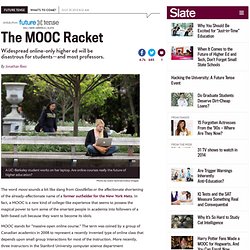
In fact, a MOOC is a new kind of college-like experience that seems to possess the magical power to turn some of the smartest people in academia into followers of a faith-based cult because they want to become its idols. What is a MOOC? Deakin University MOOCs to Issue Credit Using Credly Digital Badges. DeakinConnect Integrates “Open Credit” API, Offers MOOC on ‘Humanitarian Responses to Disasters’ A new massive open online course (MOOC) will explore the humanitarian sector and its role in disaster and emergency response, according to an announcement made today by Deakin University, one of Australia’s most respected and awarded universities.
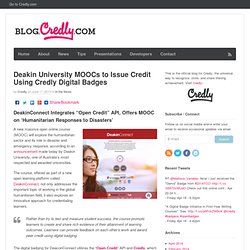
The course, offered as part of a new open learning platform called DeakinConnect, not only addresses the important topic of working in the global humanitarian field, it also explores an innovative approach for credentialing learners. Rather than try to test and measure student success, the course prompts learners to create and share rich evidence of their attainment of learning outcomes. Learners can provide feedback on each other’s work and award peer credit using digital badging. The digital badging for DeaconConnect utilizes the “Open Credit” API and Credly, which allows learners to receive, manage, store and share their digital credentials. University of London - First English University to Launch on Coursera. London (PRWEB UK) 10 June 2013 The University of London International Programmes is launching four free massive open online courses (MOOCs) on the Coursera online platform, making it the first English university to do so.
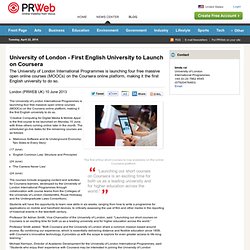
Coursera to Offer Free Online Learning Textbooks. Retention and Intention in Massive Open Online Courses: In Depth. Vanderbilt University creates institute devoted to digital learning, MOOCs. Amid coordinated effort to transform higher ed with Coursera, some faculty remained in the dark. Some faculty leaders were surprised this week when state systems and flagship universities in nine states announced a series of new business partnerships with Coursera, the Silicon Valley-based ed tech company.
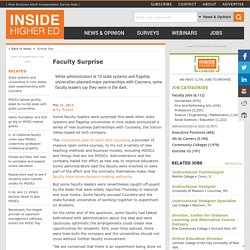
The universities plan to work with Coursera, a provider of massive open online courses, to try out a variety of new teaching methods and business models, including MOOCs and things that are not MOOCs. Administrators and the company hailed the effort as new way to improve education. Some administrators said the faculty were involved or were part of the effort and the contracts themselves make clear faculty have some decision-making authority.
But some faculty leaders were nevertheless caught off-guard by the deals that were widely reported Thursday in national and local media. MOOC as Courseware: Coursera's Big Announcement in Context. Today’s big news is that Coursera, the largest of the MOOC providers, has signed with 10 public statewide systems.
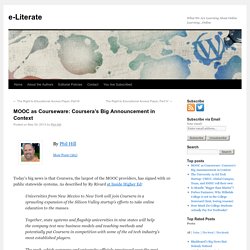
As described by Ry Rivard at Inside Higher Ed: Universities from New Mexico to New York will join Coursera in a sprawling expansion of the Silicon Valley startup’s efforts to take online education to the masses.Together, state systems and flagship universities in nine states will help the company test new business models and teaching methods and potentially put Coursera in competition with some of the ed tech industry’s most established players.The push, which company and university officials previewed over the past several days, is not a single effort but several pilot projects with different goals.
You can stop worrying about MOOCs now. I guess we all knew the MOOC bubble would burst sometime, but I'm saying it's happened this week - it just doesn't know it yet. The reason? Commercial MOOC providers have started making noises about becoming elearning courseware providers for standard education providers. So we have Clayton "I'll disrupt your breakfast" Christensen talking about " hybrid innovation ". This turns out to be blended learning, which many people have been promoting for at least 15 years (although calling it hybrid innovation at least maintains the illusion that it's new and sexy for a while longer).
The Aussie Coursera? A new homegrown MOOC platform arrives. A new free online education platform has been launched in Canberra today, by tertiary education minister Chris Bowen. Open Universities Australia, a private distance and online education organisation, has stepped into the world of Massive Open Online Courses (MOOCs) with a new online platform called Open2Study. Mr Bowen, who signed up for a course on anthropology at the launch, said “we don’t yet know what the full impact online forces will have on the delivery of higher education.
But we know it’s going to have a big impact… and we know that any university or any institution that doesn’t respond and offer flexible programs is going to fall behind.” Paul Wappett, Open Universities Australia CEO, said students wouldn’t “pay a cent” for courses with no hidden costs for textbooks, student admin or exams. “We’re focused on delivering outstanding quality, but without the price tag”, he said. But, he maintained, these courses would not be a replacement for tertiary studies. Coursera.org. Coursera Announces Details for Selling Certificates and Verifying Identities - Wired Campus - The Chronicle of Higher Education. Are MOOCs becoming mechanisms for international competition in global higher ed? Link here for the Inside Higher Ed version of this article if you need a better format for printing or sharing (e.g., via Twitter).
Are Massive Open Online Courses (MOOCs) becoming mechanisms for international competition in global higher education? Where are Europe’s MOOCs in the context of the dearth of lifelong learning opportunities in the region, or both the internal and external/global dimensions of the European Higher Education Area? Open University launches British Mooc platform to rival US providers. A UK-based platform for massive open online courses (Moocs) to rival established providers in the US has been launched by The Open University. Futurelearn will carry courses from 12 UK institutions (see list), which will be available to students across the world free of charge.
It will follow in the footsteps of US providers including Coursera, edX and Udacity, which offer around 230 Moocs from around 40 mostly US-based institutions to more than 3 million students. The new platform will operate as an independent company, majority owned by The Open University, although details of other investors have yet to be confirmed. Simon Nelson, a key player in the development of BBC's online offerings, including the iPlayer, has been recruited to head up the new company.
Revolutionizing Education On Campuses and Worldwide - edX. Coursera strikes MOOC licensing deal with Antioch University. Coursera, the largest provider of massive open online courses (MOOCs), has entered into a contract to license several of the courses it has built with its university partners to Antioch University, which would offer versions of the MOOCs for credit as part of a bachelor’s degree program.
The deal represents one of the first instances of a third-party institution buying permission to incorporate a MOOC into its curriculum -- and awarding credit for the MOOC -- in an effort to lower the full cost of a degree for students. It is also a first step for Coursera and its partners toward developing a revenue stream from licensing its courses. “It’s a very different kind of arrangement than our university partnerships,” says Daphne Koller, a Coursera co-founder, who along with her co-founder Andrew Ng has signed deals to host MOOCs from 33 universities on Coursera’s platform.
Indiana University announces IU Online, a major new online education initiative. Last modified: Wednesday, September 5, 2012 FOR IMMEDIATE RELEASE Sept. 5, 2012 BLOOMINGTON, Ind. -- Indiana University has announced IU Online -- a major strategic investment in online education that will accelerate the development and delivery of quality online courses and programs at IU's campuses statewide, address Indiana's economic and professional development needs, and extend the university's global reach.
The IU Online education initiative, which will be seeded with an initial investment of $8 million over the next three years, reflects the major impact online technologies are having in reshaping the higher education landscape as well as the university's commitment to adopting new and innovative modes of teaching and learning supported by its extensive information technology infrastructure. IU Online will address four priorities: Creating undergraduate degree programs. Earning college credit for MOOCs through prior learning assessment. Massively open online courses, or MOOCs, are not credit-bearing. Online Learning: More Than Just a MOOC « TechKNOW Tools.
Mobile learning. The March of the MOOCs: Monstrous Open Online Courses. MOOCs are a red herring. The MOOC didn’t appear last week, out of a void, vacuum-packed. The MOOC has been around for years, biding its time. Still, the recent furor about MOOCs, which some have called “hysteria,” opens important questions about higher education, digital pedagogy, and online learning. What's the Matter With MOOCs? - Innovations. Top US universities put their reputations online. PLANE. What is the theory that underpins our moocs? Four Barriers That MOOCs Must Overcome To Build a Sustainable Model. Given the hype of national media coverage of massive open online courses (MOOCs), it is refreshing to see more recent analysis looking at important attributes such as revenue models, dropout rates, and instructional design.